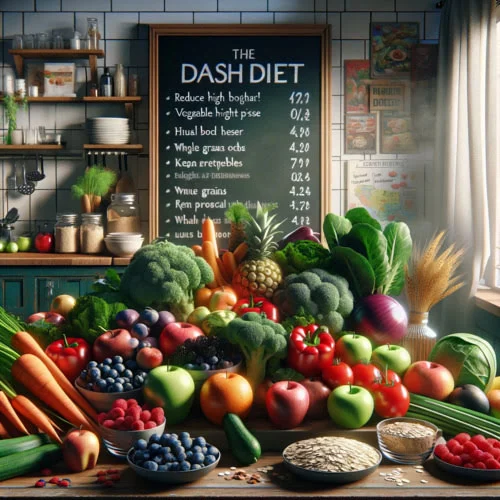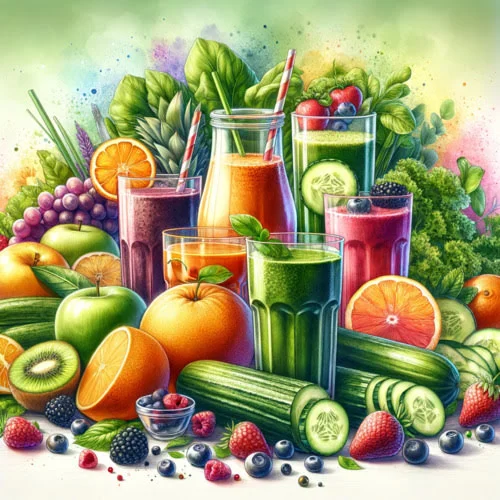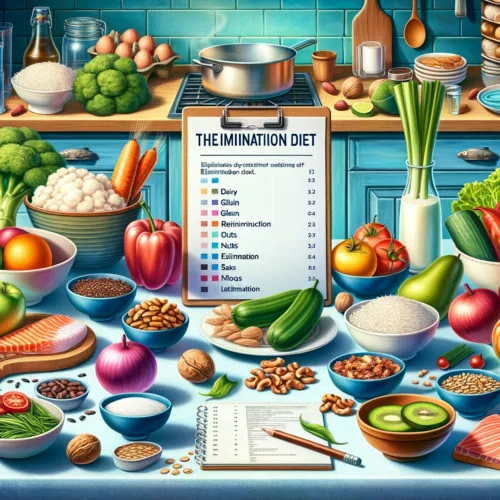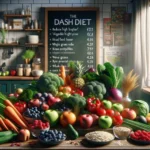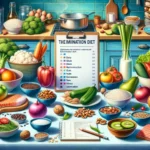The DASH diet (Diet for Hypertension) is designed to lower blood pressure and maintain overall health. It was developed by doctors at the U.S. National Heart, Lung, and Blood Institute (NHLBI) and has become a recognized method of controlling hypertension. In this article, we will look at who the DASH diet is suitable for, what foods can be consumed and what foods should be restricted.
| Pros of the DASH diet | Minuses of the DASH diet |
|---|---|
| Reduced blood pressure | Requires attention to food selection and meal planning. |
| Promotion of a healthy lifestyle | Not always effective for weight loss. |
| Reducing the risk of cardiovascular disease | May require more time to prepare healthy meals. |
| Increased consumption of fruits and vegetables | Limits the intake of certain foods such as sugar and salt. |
| Increasing potassium and calcium levels in the diet | It can be difficult to comply in environments where highly salted and processed foods are available. |
| Encourages moderate consumption of meat and fats | Requires more active participation in food selection and food preparation. |
| Teaching healthy eating habits | Can be expensive due to increased consumption of fresh produce and organic foods. |
Who is the DASH diet suitable for?
The DASH diet is recommended for people with high blood pressure or at risk of developing it. It is also suitable for anyone seeking a healthy lifestyle and a balanced diet. The DASH diet may be particularly beneficial for people with a family predisposition to hypertension, cardiovascular disease or weight problems.
Foods allowed in the DASH diet
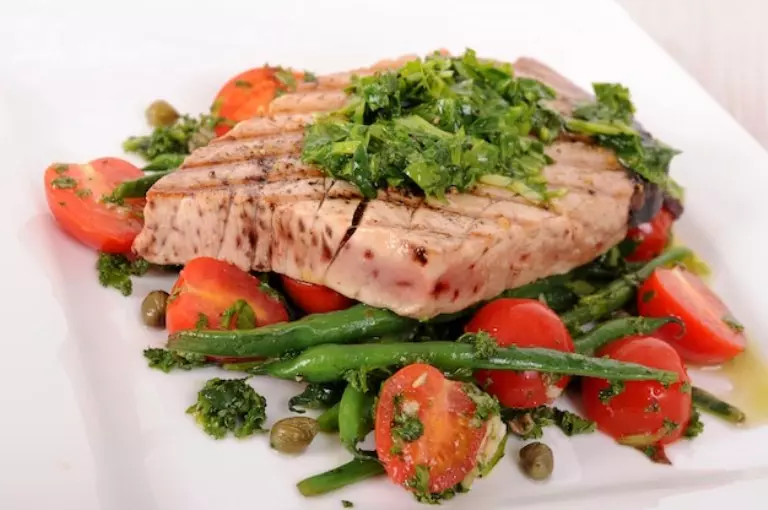
The DASH diet involves consuming certain nutrient-rich foods such as:
1. Fruit: Apples, pears, bananas, berries, citrus fruits and other fresh fruits.
2. Vegetables: Leafy green vegetables, carrots, broccoli, tomatoes, cucumbers and other vegetables of various colors.
3. Cereals and grain products: Oatmeal, rice, whole wheat bread, wheat bran, quinoa and other grains.
4. Protein: Low-fat dairy products, fish, seafood, chicken meat, tofu, beans, peas and nuts.
5. Dairy products: Low-fat milk, unflavored yogurt, low-fat cottage cheese and low-fat cheese.
Foods that should be restricted in the DASH diet
In the DASH diet, it is recommended that you limit your intake of the following foods:
1. Salty foods: Salt intake can increase blood pressure, so the DASH diet recommends cutting back on salty snacks, canned foods, salted meats and sausages. Replace salt with seasonings and herbs to add flavor to your meals.
2. Fast food and high-calorie foods: The DASH diet is designed for healthy eating, so it is recommended that you limit your intake of fast food, fatty meats, sweets, carbonated drinks, and other high-calorie foods.
3. Fatty dairy products: The DASH diet recommends choosing low-fat or fat-free dairy products such as skim milk, yogurt and cottage cheese. Limit consumption of butter and low-fat cheeses.
Menu of foods for each day of the week and their caloric content

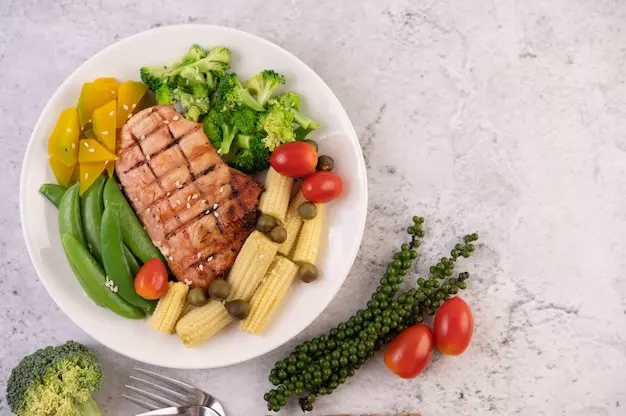




Here is a sample menu of foods for each day of the week on the DASH diet with caloric content:
Monday:
– Breakfast: Egg white omelet with vegetables(150 kcal)
– Afternoon snack: Apple(80 kcal)
– Lunch: Greek salad with quinoa and chicken(350 kcal)
– Afternoon snack: Nuts(100 kcal)
– Dinner: Baked fish with grilled vegetables(400 kcal)
Tuesday:
– Breakfast: Oatmeal with berries and almond nuts(250 kcal)
– Afternoon snack: Grapefruit(70 kcal)
– Lunch: Stewed vegetables with tofu(300 kcal)
– Afternoon snack: Carrots with guacamole(100 kcal)
– Dinner: Bean chili with quinoa(400 kcal)
Wednesday:
– Breakfast: Toast of whole wheat bread with avocado and egg(300 kcal)
– Afternoon snack: Mixed nuts(150 kcal)
– Lunch: Greek salad with olives and feta(350 kcal)
– Afternoon snack: Green smoothie with spinach and banana(200 kcal)
– Dinner: Fried salmon with mashed potatoes and spinach(450 kcal)
Thursday:
– Breakfast: Yogurt with berries and nuts(250 kcal)
– Afternoon snack: Peach(60 kcal)
– Lunch: Quinoa with vegetables and baked chicken fillet(400 kcal)
– Afternoon snack: Mini carrots with hummus(100 kcal)
– Dinner: Stewed vegetables with shrimp(350 kcal)
Friday:
– Breakfast: Egg omelette with spinach and tomatoes(200 kcal)
– Afternoon snack: Grapefruit(70 kcal)
– Lunch: Light salmon with mixed vegetables(400 kcal)
– Afternoon snack: Tropical smoothie with pineapple and coconut milk(200 kcal)
– Dinner: Quinoa with braised mushrooms and spinach(350 kcal)
Saturday:
– Breakfast: Avocado toast with tomatoes and basil(300 kcal)
– Afternoon snack: Tangerine(40 kcal)
– Lunch: Greek salad with chicken and olives(350 kcal)
– Afternoon snack: Cod with steamed broccoli(200 kcal)
– Dinner: Vegetable stew with beans(400 kcal)
Sunday:
– Breakfast: Oatmeal with berries and almond butter(250 kcal)
– Afternoon snack: Apple(80 kcal)
– Lunch: Chicken stew with vegetables and quinoa(400 kcal)
– Afternoon snack: Mixed nuts(150 kcal)
– Dinner: Baked vegetables with cottage cheese sauce(350 kcal)
The DASH diet offers a varied and nutritious menu rich in fruits, vegetables, grains and lean proteins. This diet is designed to lower blood pressure and improve overall health. It is suitable for people with hypertension, as well as for anyone seeking a healthy lifestyle.
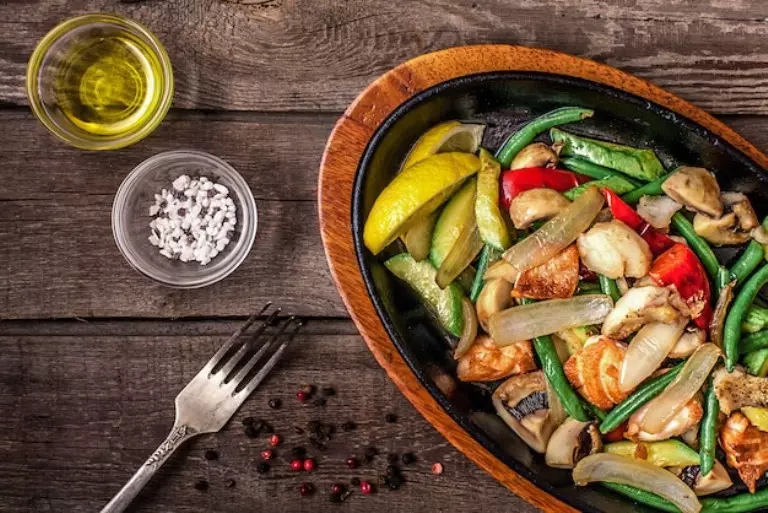
The DASH diet – the pros
1. Lowering Blood Pressure: The DASH diet is specifically designed to lower blood pressure and can be an effective means of controlling hypertension.
2. Nutrient Rich: The DASH diet offers a wide variety of nutritious foods such as fruits, vegetables, grains and lean proteins that provide the body with everything it needs to function properly.
3. Balanced nutrition: The DASH diet emphasizes a balanced intake of carbohydrates, proteins and fats to help maintain a healthy weight and overall body condition.
The DASH diet – cons
1- Restricting Certain Foods: The DASH diet involves limiting salty foods, fatty dairy products, and high-calorie foods, which can be a challenge for fans of certain foods or standard diets.
2. Individual adaptation: The DASH diet may require individual adaptation, especially if there are special dietary needs or preferences.
Overall, the DASH diet is a healthy and balanced approach to eating that helps lower blood pressure and improve overall body health. However, it is recommended that you consult a doctor or dietitian before starting any diet, especially if you have any medical problems or needs.
Frequent questions
The DASH diet is an eating plan that focuses on consuming fruits, vegetables, low-fat dairy products, nuts, seeds, low-fat meats and fish, and limits salt, sugar and high-sugar foods.
The basic principles include increasing potassium, magnesium and calcium intake from foods, reducing salt, reducing saturated fat intake and limiting sugar.
It is recommended to consume vegetables, fruits, store low-fat dairy products, nuts, seeds, integral grains, low-fat meats, fish and even some sweets with moderate sugar content.
The DASH diet can help lower blood pressure, reduce the risk of cardiovascular disease, improve overall health, and reduce inflammation.
The DASH diet can be adapted for a variety of dietary restrictions, including vegetarianism and veganism.
Recommendations include regular consumption of fruits and vegetables, limiting salt, reducing saturated fat, moderate consumption of dairy products and fish, and limiting sugar and processed foods.
The DASH diet is generally considered safe and healthy for most people, but it is always best to consult a doctor before starting any diet, especially if you have any medical problems or restrictions.

